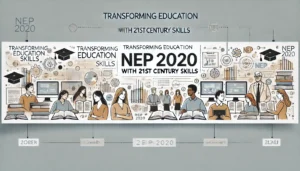Introduction
The National Education Policy (NEP) of 2020 is set to transform India’s education system by 2040. This policy goes beyond traditional academics, focusing on life skills, emotional learning, and physical growth. By emphasizing hands-on and interactive learning, NEP offers flexibility and choice in the curriculum, aiming to empower students to achieve their dreams and responsibilities.
Key 21st Century Skills Advocated by NEP
The NEP 2020 highlights essential skills that students need for the modern world. These 21st-century skills include:
Literacy Skills:
- Information literacy
- Media literacy
- Technology literacy
Learning Skills:
- Creativity
- Critical thinking
- Communication
- Collaboration
Life Skills:
- Flexibility
- Leadership
- Initiative
- Productivity
- Social skills
These skills are crucial for success in a tech-driven and digitally advanced world.
Integrating 21st Century Skills into School Curriculum
NEP 2020 aims to reshape the education system with several key initiatives:
- New Academic Structure: A 5+3+3+4 system covering ages 3-18
- Enhanced Teacher Training: Improved teaching methods and continuous professional development
- Technology Integration: Promoting digital literacy and tech-savvy learning environments
- Reformed Assessments: Emphasizing critical thinking, problem-solving, and application-based learning
- Cultural Values and Ethics: Instilling India’s heritage and ethical values in students
- Inclusivity and Equity: Ensuring equal access to quality education for all students
- Language Proficiency: Strengthening proficiency in multiple languages, including regional languages
Multimodal Learning and Smart Classrooms
To support comprehensive growth, multimodal learning is crucial. This includes:
- Visual Learning: Charts, illustrations, videos, and diagrams
- Auditory Learning: Audiobooks, podcasts, and verbal explanations
- Reading and Writing: Textbooks, e-books, and various written exercises
- Kinesthetic Learning: Hands-on activities, lab sessions, and field trips
Smart classrooms with technologies like Smart TVs and virtual textbooks can transform learning, making it more engaging for diverse learning styles.
Performance-Based and Activity-Based Learning
NEP 2020 emphasizes active student participation. Methods like plays, quizzes, role-plays, and debates can boost higher-order thinking, problem-solving, and reasoning skills. These interactive methods make learning enjoyable and effective.
Group-Based Assignments and Projects
Group assignments help students develop crucial 21st-century skills such as collaboration, time management, communication, and accountability. They promote peer learning and teamwork, enabling students to tackle complex tasks and achieve common goals.
Real-World Connections and Community Engagement
Connecting classroom learning with real-world applications is essential. Encouraging students to engage with their communities through projects, internships, and volunteer work helps them understand the practical implications of their education and fosters a sense of social responsibility.
Continuous Professional Development for Teachers
Teachers play a crucial role in teaching these skills using innovative strategies and modern technologies. Effective approaches include:
- Problem-Based Learning: Encouraging students to investigate and solve real-world problems
- Cooperative Learning: Fostering inclusion and creativity through group work
- Authentic Learning: Connecting the curriculum with real-world contexts
- Multimedia Integration: Enhancing engagement with digital tools
Upskilling teachers through platforms like SWAYAM and DIKSHA, along with simulators, assessment tools, and other digital resources, is essential. Implementing a National Mission for Mentoring can further support teacher development.
Suggestions for Government to Promote NEP 2020
To effectively promote the NEP 2020 and its benefits to the masses, the government should consider the following:
- Awareness Campaigns: Launch nationwide awareness campaigns through various media channels to educate the public about the importance of 21st-century skills.
- Teacher Training Programs: Provide extensive training programs for teachers, incorporating modern teaching methods and the latest technological tools. Platforms such as Khan Academy, Coursera, and edX can offer valuable resources.
- Incentives for Schools: Offer incentives for schools that successfully integrate 21st-century skills into their curriculum, such as grants, awards, and recognition.
- Public-Private Partnerships: Foster partnerships between the government, private sector, and educational institutions to share resources and expertise.
- Community Engagement: Encourage community involvement in schools through volunteer programs, local business partnerships, and parent-teacher associations.
- Monitoring and Evaluation: Establish a robust system for monitoring and evaluating the implementation of NEP 2020, ensuring continuous improvement and accountability.



